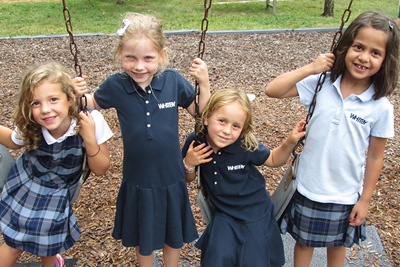Transitioning your child from a preschool program into full-time Kindergarten is an exciting—and terrifying—moment for parents. How do you know if your child is really ready to take the next step in their education?
Fortunately, the U.S. Department of Education has created a guideline, the 5 Domains of School Readiness, to help parents and educators determine if children have the skills they need to succeed in Kindergarten and beyond.

What are the 5 Domains of School Readiness?
The U.S. Department of Education defines the five domains of school readiness as follows:
- Language and literacy development
- Cognition and general knowledge (including early mathematics and early scientific development)
- Approaches toward learning
- Physical well-being and motor development
- Social and emotional development
These five domains are intended to be overlapping and connected indicators of a child’s ability to succeed in a school setting. They’re not intended to be chronological milestones, but rather skills that children develop simultaneously. The domains also serve as a way for early childhood education (ECE) programs to guide their curriculum towards school readiness and age appropriate development.
A National Educational Goals Panel first articulated these five domains in a 1995 paper after “school readiness” was voted to be the first priority in a series of National Education Goals.
A 2012 international report from Unicef nearly echoes the five domains set out by the National Education Panel, reinforcing the importance of "a good start in life, in a nurturing and safe environment that enables children to survive and be physically healthy, mentally alert, emotionally secure, socially competent and able to learn."
In other words, all children, regardless of cultural background or family or school structure, benefit when these foundational building blocks of safety, security, and ability to engage are in place. The report goes on to state that school readiness is a complicated "product of the interaction between the child and the range of environmental and cultural experiences that maximize the development outcomes for children." The five domains can help families and educators alike to better understand what it means to be "ready" for school.
The Importance of School Readiness for Families
While the benefits of a high quality early childhood education program are well established, it's important not to underestimate the role that families can play in helping support early stages of development.
Here’s how you can help your child increase their school readiness at home:
1. Language and Literacy Development
Reading out loud to children has a major impact on emergent literacy skills. To help your child increase their language skills, read to your child throughout all aspects of family life—not just at bedtime. The newspaper, articles on your smartphone, recipes, letters and holiday cards are all opportunities to read out loud to your child.
Hearing new vocabulary spoken helps prepare children to identify unfamiliar words from context, as well as increase their overall phonological awareness. The research also makes clear that engaging with oral language, even in casual conversation, can positively affect emergent literacy.
Quoted: At age three, children [with] an observed cumulative vocabulary of 1100 words [had] parents [who] spent a lot of time and effort asking their children questions, affirming and expanding their responses and encouraging their children to listen and notice how words relate.
- Reading Out Loud to Children: The Evidence
2. Cognition and General Knowledge
Researchers from Indiana University describe general knowledge as having two components: "One component is details about the world in which we live...[t]he second component is the processes of how things work."
To help your child develop their cognitive skills at home, focus on creating an environment where your child feels comfortable asking questions about the world and the processes that govern it. Asking open-ended questions also encourages a sense of exploration. Developing your child’s curiosity can inspire them to dive into the subjects that interest them and cultivate background knowledge that will improve their reading comprehension and other essential academic skills.
3. Approaches toward Learning
For children to become effective learners, they need to develop their curiosity, creativity, independence, ability to cooperate, and persistence. There are several ways you can support your child in developing those characteristics.
Cultivate persistence by encouraging your child to follow through on a task. Give them the time and space needed to work independently through problems—even tasks as simple as stacking building blocks. Playdates with other children can develop your child’s ability to work collaboratively and help your child become more creative by giving them toys that encourage exploration.
4. Physical Well-being and Motor Development
Although one of the most basic skills taught in primary school, handwriting can be very complicated to learn. That’s one of the reasons it’s so important for children to develop fine motor skills before they’re ready to enter Kindergarten. Physical well-being is also an important barometer for parents to determine how ready their child is take the next step in their education. By identifying any physical challenges early on, you can help your child get the support they need.
Keep an eye on your child’s physical well-being and motor development by monitoring their overall rate of growth, fitness, and physiology. Encourage motor development by engaging in age-appropriate physical activities with your child, such as walking, running, and kicking a ball, as well as finer skills, such as teaching them how to use scissors and fasten a button.
5. Social and Emotional Development
Success in school is not just about academics. It’s also about developing the skills to relate to peers and educators. For that reason, it’s important to help your child work on their social and emotional development as you’re getting them ready for Kindergarten.
To help your child develop socially and emotionally, look for opportunities to help them form relationships and interact with both peers and adults. Arrange playdates and encourage your kids to spend time talking with coaches, educators and other trusted adults. To encourage a sense of self, ask your child questions about their preferences and interests and ask them to compare their interests to those of their peers. This will help them define their identity in relation to the others. Help your child develop empathy for others by asking them to share with their friends. If your child likes to play pretend, you can also help them develop empathy by asking them to speculate how their character thinks and feels in different situations.
The Importance of School Readiness
Your child’s first years in school will set them up for the rest of their academic career. For that reason, it’s important to make sure that they’re ready socially, emotionally, intellectually and physically to enter Kindergarten.
As a parent, you can help your child develop the skills they need to succeed by offering opportunities to engage in activities that allow them to build skills, grow as human beings and learn about the world. You also can help set your child up to succeed by enrolling them in a high quality early childhood education program that uses preschool best practices to help students develop the five domains of school readiness. A strong, early learning foundation will help set-up your child for a lifetime of personal, professional and academic success.
To learn more about Whitby’s early childhood education program, schedule a tour of our unique International Baccalaureate and Montessori preschool program. Or click below for our guide to help parents choose the right private school for their child.



